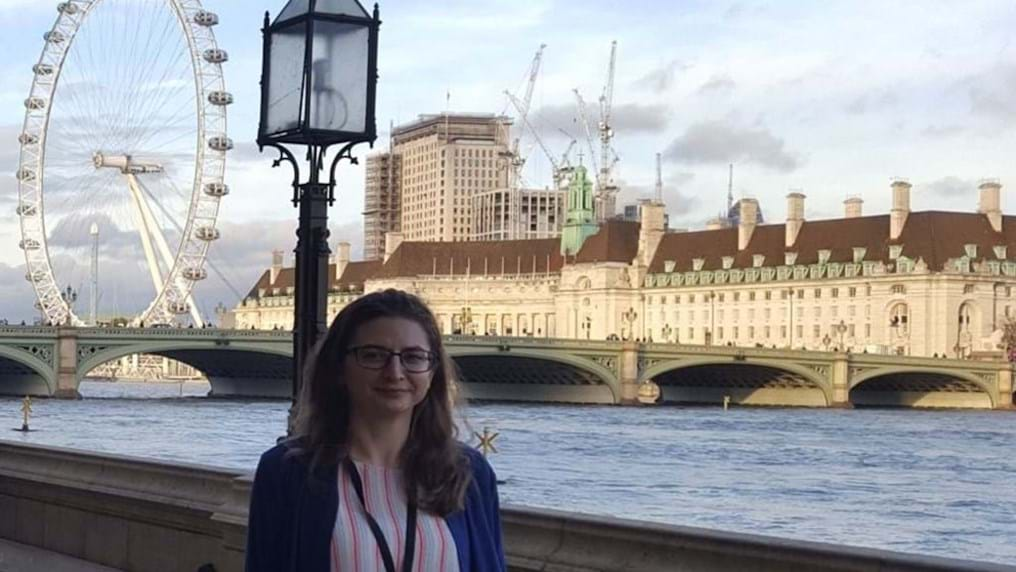GUEST BLOG: Advising MPs from a ChemEng perspective - my Ashok Kumar Fellowship

23rd October 2017
In January 2017, Erin Johnson, a postgraduate chemical engineering student at Imperial College London, UK, was awarded the Ashok Kumar Fellowship 2017.
The annual Fellowship, supported by IChemE and the North-East England process Industry Cluster (NEPIC), grants funding for a graduate chemical engineer to spend three months working at the UK Parliamentary Office for Science and Technology (POST). During this time, they get to experience life inside the Houses of Parliament and produce a POSTnote (briefing paper), or assist a government select committee with a current inquiry.
MPs rely on scientists, engineers, and academics to help inform the decisions they make. Erin’s Fellowship began in September, so we thought we’d find out how she’s been getting on.

Education: Postgraduate chemical engineering student at Imperial College London, UK
Job Title: PhD candidate
Research interests: Optimisation of biomethane and bio-synthetic natural gas supply chains in the UK. I recently co-authored a white paper on options for a greener gas grid.
Tell me about your fellowship and the topic of your POSTnote?
My briefing note is on the fire safety of building materials.
The Grenfell tower tragedy has raised questions about the safety of certain types of materials, and this note will give MPs and peers an overview of the technical aspects they should be aware of.
What is it about this topic that interests you?
This is a life and death topic, and these issues affect people in very real ways. There’s a lot of work going on in this area across academia, industry and government, and momentum has gathered to make improvements to the fire safety of building materials.
What have you been working on since you’ve started your placement; and what’s to come?
I’m now four weeks into my Fellowship. My first task was to develop the scope of the work with the advice of colleagues and experts. I then researched who were the key individuals across academia, industry and government, and started conducting interviews with them. I have been gathering their views and researching the literature on what the critical topics are regarding the science of fire, building materials we use today and how they are applied, and the regulations and guidance intended to keep us safe. I’ve begun drafting the briefing note around these themes, but still have many more stakeholders to consult. This will be followed by a period of internal and external review to ensure that the article is balanced and accurate, before it’s published in January.
It’s a big responsibility to write these briefings which may affect how Parliamentarian’s think about an issue and can ultimately have an impact on policy and legislation. A lot of care goes into making sure the information we provide is accurate, balanced and covers all relevant issues, whilst also being clear and concise. I’m still learning how to walk this tight rope!
How have you been applying your skills and knowledge in chemical engineering while in this role?
Although this is a completely new topic for me, I am grateful to have some background in process safety. I previously worked in the gas sector, so I’m familiar with managing fire and explosion hazards and also have an understanding of risk from an engineering point of view, which has been very useful.
Why did you decide to apply for the Ashok Kumar Fellowship?
The Ashok Kumar Fellowship is a fantastic chance to bridge politics, engineering and academic research. It’s perhaps also a less conventional way to make use of a chemical engineering mindset to benefit society!
After my PhD, I’d like to help shape evidence-based policy. Working in POST has given me a window into the world of Westminster and I’m now considering different possibilities that otherwise I would never have known about.
What were you hoping to gain from the Fellowship?
I saw this as a fantastic opportunity to take on a new challenge. I love to research widely on topics, understand evidence and its limitations, and then communicate their essence in an engaging and succinct way. I hope to cultivate the art of communicating complex ideas simply.
I also wanted to meet new people. I’m lucky to have already met with MPs and committee members, and I’m gaining a broad understanding of how Parliament works.
Why do you think this type of experience is valuable?
This experience is extremely valuable to me, and I’m getting a lot of inspiration of where I could take my career in the future. But I think the true value of these opportunities is in advocating science and technology to a wider audience. Helping MPs to understand technical issues so they can make well-informed decisions has to be good for all of us – right?
Can you give three tips to someone undertaking this placement in future?
- Get in touch with as many experts as you can early on. This topic is completely new to me so I have relied on a wide range of knowledgeable people who have been extremely generous in taking the time to explain the issues to me.
- Impartiality is crucial to the role of POST, and therefore the Fellow must provide an accurate and representative view in their research and briefing note. Seek a wide range of opinions, and learn where the consensus and evidence-base lies before you start writing.
- Enjoy it! It’s nice to have a change from PhD work, and make sure you make the most of meeting new people and exploring all the different parts of the Houses of Parliament.
The Ashok Kumar Fellowship is open to researchers with postgraduate qualifications (ie PhD, EngD, Masters), as well as postgraduate students in engineering or other disciplines related to the chemical and process industries.
Want to be an IChemE Ashok Kumar Fellow? Apply here.